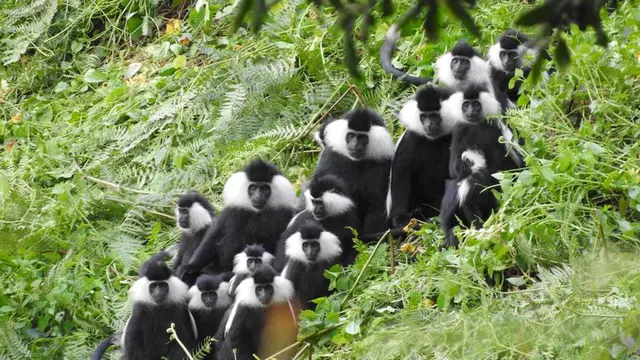Social distancing among eight separate groups of monkeys in Ghana has been found to have a profound impact on the spread of disease, according to new research.
There are millions of microorganisms living inside of and on our bodies that play a crucial role in our health, especially the microbes in our guts.
"Social microbial transmission among monkeys can help inform us about how diseases spread," said Eva Wikberg, an assistant professor at the University of Texas, San Antonio.

What are you allowed to do now?
"This has parallels to our current situation in which we are trying to understand how social distancing during the
COVID-19
pandemic and future disease outbreaks may influence disease transmission."
The microorganisms which live in the digestive tract, from the stomach through to the colon, are known as the gut microbiome.
Scientists are increasingly focusing on the gut microbiome which researchers believe can be a driving factor behind obesity, immune function and even behavioural changes.
But researching microbiomes is difficult because of the variation in microbial composition between individuals, according to the university.
One of the longest standing questions about this variation is whether it is down to genetic differences or if it is a product of social environments.
Ms Wikberg and her colleagues studied the faeces of 45 female colobus monkeys which congregated in eight different social groups in a small forest in Ghana - and they found the distinct groups indeed had distinct microbiomes.
But crucially, some individuals from different groups which were more closely connected in those groups' social network had more similar microbiomes, according to the research published in the journal Animal Behaviour.
"This discovery indicates that microbes may be transmitted during occasional encounters with members of other social groups," the researchers noted.
"A similar setting may be when people come into one-metre proximity of each other at a store. Being in close proximity or accidentally brushing up against someone else may be all it takes to transmit certain microbes," they added.
But even if social distancing is directly correlated to the microbes shared between individuals, it isn't clear why the social groups haven't evolved to completely avoid outsiders.
"Further research is needed to investigate whether this type of transmission yields health benefits, which could explain why different social groups occasionally have friendly between-group encounters," the researchers added.
"Studies of wild animals can teach us a lot about the importance of using interventions, such as social distancing, to ensure a safer community during this pandemic," said Dr Wikberg.
 简体中文
简体中文

